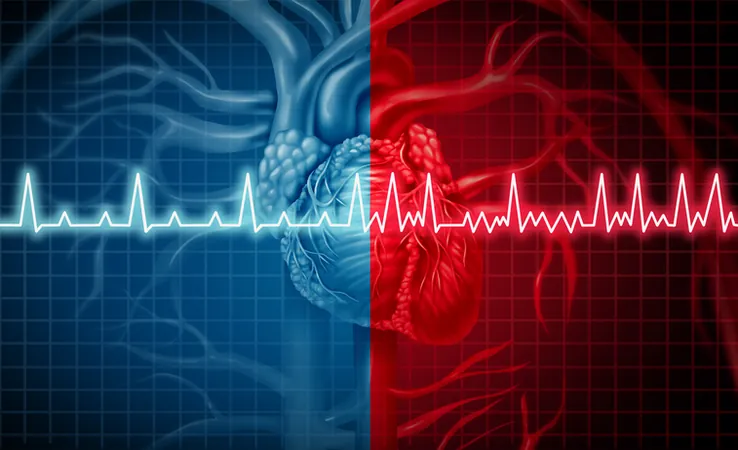
Shocking New Study Links Atrial Fibrillation in Under-70s to Increased Risk of Dementia!
2025-04-01
Author: Sarah
Introduction
In a groundbreaking revelation at the European Heart Rhythm Association (EHRA) 2025 Congress, new research has established a concerning connection between atrial fibrillation (Afib) and a strikingly higher risk of dementia for those diagnosed before the age of 70. The study indicates that these individuals face a staggering 21% increased risk of developing dementia, with an even more alarming 36% rise in cases of early-onset dementia—diagnosed before the age of 65.
Research Overview
Dr. Julián Rodriguez García, a cardiologist from Bellvitge University Hospital in Barcelona, led the study, which stands out as the largest European population-based examination of this vital relationship. "Our findings demonstrate that the link between Afib and dementia is significantly stronger in younger patients, particularly in those diagnosed early," Dr. García stated.
Methodology
Utilizing data from an extensive study involving over 2.5 million individuals aged 45 and older in Catalonia, Spain, researchers tracked the health of participants over a 15-year period, from 2007 to 2021. Notably, at the beginning of the study, 79,820 individuals had received a diagnosis of atrial fibrillation.
Key Findings
While the general increase in dementia risk associated with Afib was found to be 4%, the study pinpointed that this risk escalated dramatically for younger patients. Those diagnosed with Afib prior to turning 70 were found to be at a significantly elevated risk of developing dementia. Also noteworthy is that, for patients without previous strokes, those diagnosed with Afib earlier could see their risk for early-onset dementia soar by as much as 52%.
Historical Context
Historically, research results regarding the Afib-dementia connection have been mixed, with some studies suggesting that Afib serves as an independent risk factor, while others found no clear correlation. However, this latest study clarifies the urgency of addressing Afib in younger populations.
Clinical Implications
The implications of these findings could be profound for clinical practice. If healthcare providers can identify patients with Afib who are at heightened risk for dementia, they may be able to implement preventive measures earlier in these individuals' lives. Early detection and active management of Afib in younger patients may hold the key to mitigating the development of dementia or altering its progression.
Underlying Mechanisms
Moreover, the research team has pointed out possible underlying mechanisms that could explain the strong connection between Afib and dementia. While it is widely acknowledged that Afib is a risk factor for stroke, which in turn increases dementia risk, the study found that the association between Afib and dementia persists even after accounting for patients with prior strokes. This suggests that additional factors are at play.
Potential Mechanisms
Potential mechanisms thought to exacerbate the link include silent strokes, microinfarcts, and microbleeds—issues often challenging to detect without sophisticated imaging techniques. Furthermore, hemodynamic changes, autonomic dysregulation, and systemic inflammation caused by Afib may further deteriorate the condition of small blood vessels in the brain, increasing dementia risk.
Future Directions
Looking ahead, researchers aim to investigate whether early interventions for Afib can positively impact dementia development in younger patients. This could pave the way for innovative strategies aimed at preventing dementia in this vulnerable population, offering a glimmer of hope in the fight against both heart and cognitive diseases.
Conclusion
Stay tuned as this story continues to unfold—could the next breakthrough in dementia prevention lie in managing heart health?



 Brasil (PT)
Brasil (PT)
 Canada (EN)
Canada (EN)
 Chile (ES)
Chile (ES)
 Česko (CS)
Česko (CS)
 대한민국 (KO)
대한민국 (KO)
 España (ES)
España (ES)
 France (FR)
France (FR)
 Hong Kong (EN)
Hong Kong (EN)
 Italia (IT)
Italia (IT)
 日本 (JA)
日本 (JA)
 Magyarország (HU)
Magyarország (HU)
 Norge (NO)
Norge (NO)
 Polska (PL)
Polska (PL)
 Schweiz (DE)
Schweiz (DE)
 Singapore (EN)
Singapore (EN)
 Sverige (SV)
Sverige (SV)
 Suomi (FI)
Suomi (FI)
 Türkiye (TR)
Türkiye (TR)
 الإمارات العربية المتحدة (AR)
الإمارات العربية المتحدة (AR)